Evaluating the main mayoral candidates of Kathmandu
With just days to go for the May 13 local elections, candidates have ramped up their campaigns in all 753 local units across the country. The race for the mayor of Kathmandu Metropolitan City is particularly charged. Kathmandu’s voters want a competent leader, someone who can tackle everything from waste management to traffic congestion to poor service delivery. So who is the right person to lead the metro? Here is your guide to the strengths and weaknesses of top contenders for the post.
Balen Shah
· Independent candidate
· Born on 27 April 1990 in Kathmandu
· Graduate in civil engineering, post-grad in structural engineering

Strength |
Weakness |
Is strongly backed by the youth |
Lacks experience in politics |
Has clear agendas and is an appealing speaker |
Accused of using insensitive words against LGBTIQA+ community as a rapper |
Technically savvy and has worked with various local units in post-earthquake reconstruction |
Has little appeal among middle-aged and elderly voters |
Can work long hours |
As an independent candidate, his election campaign pales in comparison to those of candidates from political parties, reducing his reach |
Comes from non-political background and can work without any political influence |
May not be able to collaborate and cooperate with political parties’ representatives |
Keshav Sthapit
· CPN-UML
· Born on 14 September 1959 in Kathmandu
· Under-Grad in Humanities
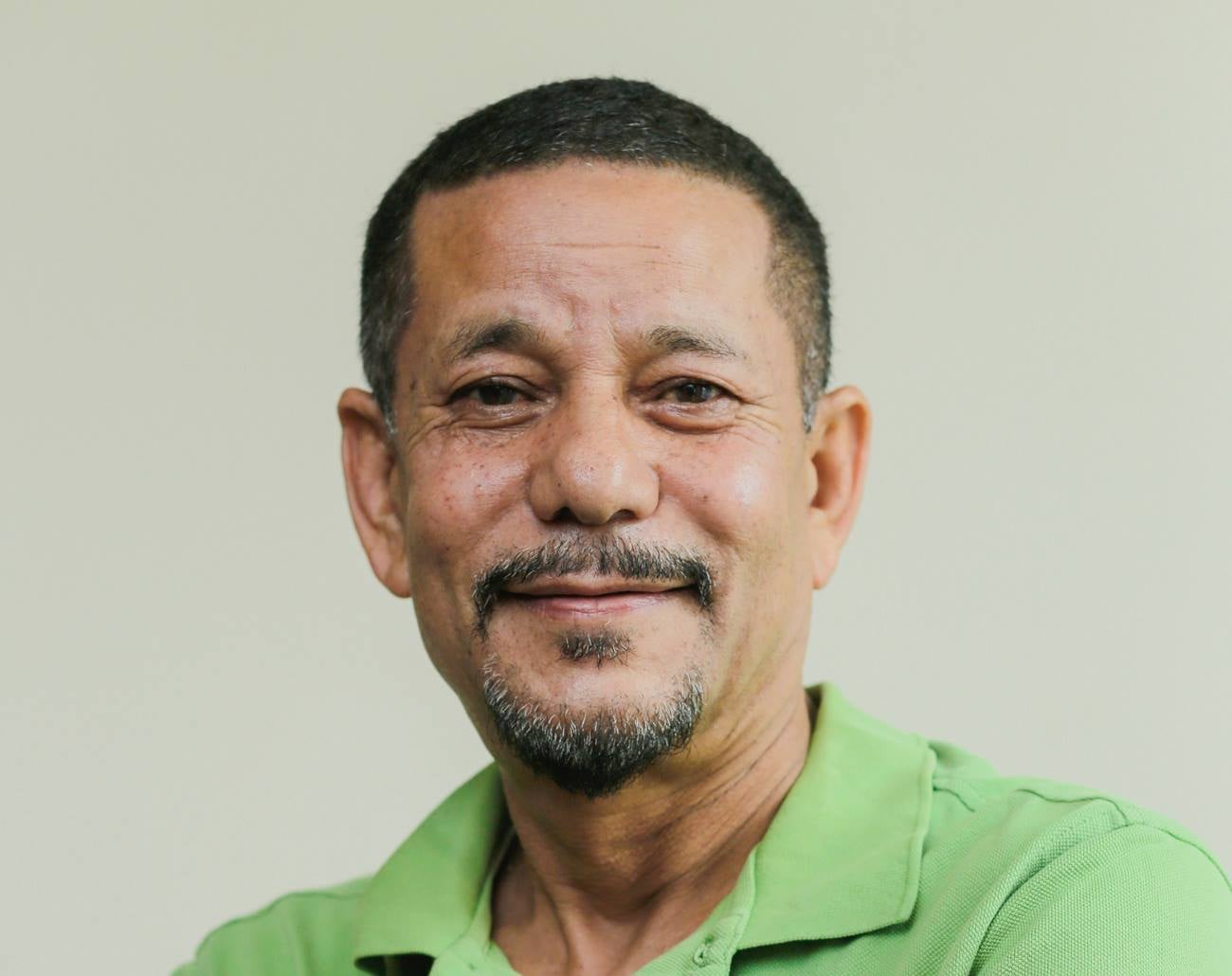
Strength |
Weakness |
Has experience of leading Kathmandu as its two-time mayor |
Implicated in two sexual harassment cases |
Established himself as a man of action in his previous mayoral stint in 1997 |
Is aggressive and uses disrespectful language at others |
A finalist in World Mayor 2004, a global mayoral evaluation |
Not a universally trusted figure in trusted UML as he has repeatedly been in and out of the party |
Is a master planner of post-1997 Kathmandu city |
Tried and tested, but not a trusted person. He was accused of lack of transparency during his first mayoral stint |
Has strong support of CPN-UML and its supporters, and Kathmandu has been a traditional UML bastion |
Bidhya Sundar Shakya, the outgoing mayor of Kathmandu, isn’t happy with Sthapit’s candidacy, which could cut Shakya panel’s votes |
Madan Das Shrestha
· Rastriya Prajatantra Party
· Born on 27 April 1948 in Kathmandu
· (Didn’t want to disclose his academic qualification)
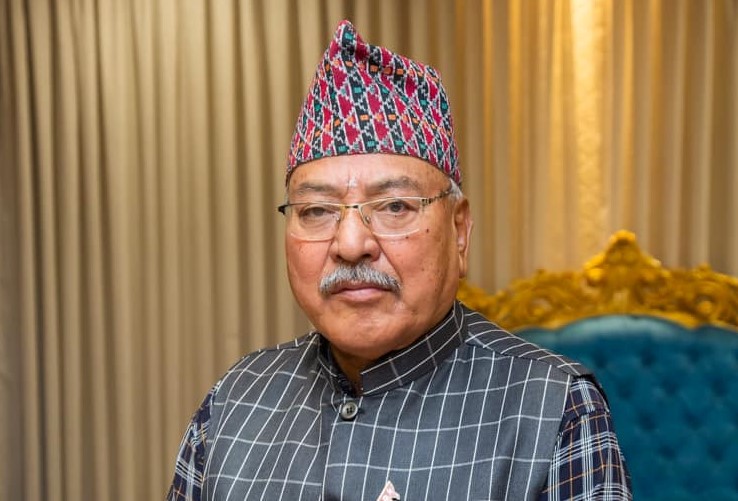
Strength |
Weakness |
Involved in social works |
Has no clear electoral agendas |
Spotless character |
Is not a fluent and appealing speaker |
Is a chairperson of an umbrella organization for 60+ aged people, National Senior Citizen Union |
Has no political experience |
Initiated road expansion and sewage management works in the Dillibazar area at his own expense |
A rather old candidate |
Is a veteran actor and well-known figure |
Has little appeal among young and middle-aged voters |
Srijana Singh
· Nepali Congress
· Born on 25 August 1962 in Gorkha
· Graduate in economics, post-grad in sociology

Strength |
Weakness |
In politics since a young age |
Many voters believe she was made a candidate because she is the wife of Nepali Congress leader Prakash Man Singh and the daughter-in-law of Ganesh Man Singh |
Comes from a family with a strong political background |
Is a less-known political figure, even among Nepali Congress voters |
Was a youth leader during the 1990 civil movement |
Was inactive in mainstream politics for decades |
Has support of young Congress cadres |
Has seldom appeared in mayoral debates and public interactions |
Is a former chairperson of Nepal Women Union, the women wing of congress and a women rights activist. Could appeal to women |
Not an appealing speaker |
Samikchya Baskota
· Bibeksheel Sajha Party
· Born on 8 Feb 1984 in Panchthar
· Graduate in constitutional law (LLB), post-grad in US legal studies (LLM)
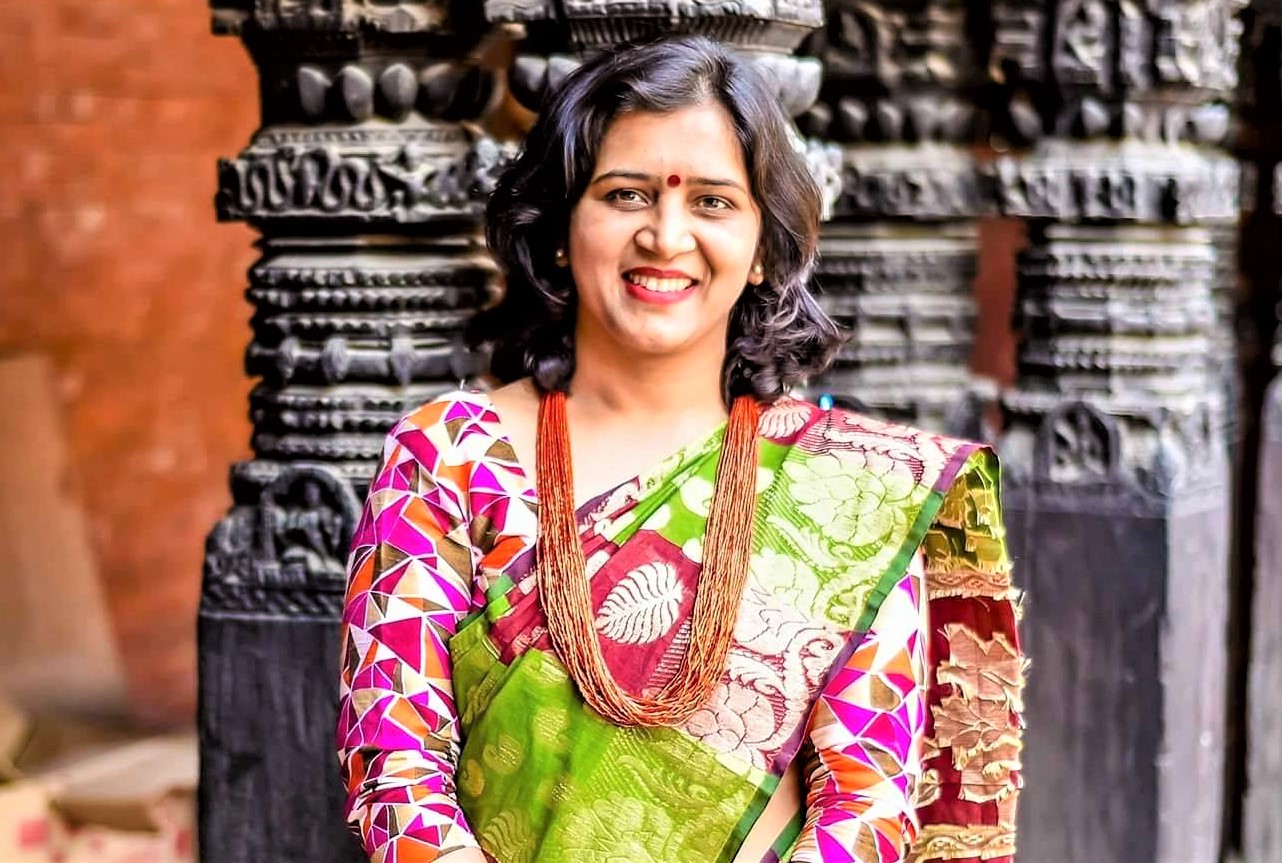
Strength |
Weakness |
Legally sound and filled with ideas on how local units can better perform |
Lost provincial assembly election from Kathmandu-1 (A) |
Stood against family politics (her father was a home state minister from Nepali Congress) |
Barely seen in public after losing the provincial assembly elections |
Is an entrepreneur and has management experience |
Accused of getting the mayoral ticket as the party president’s favorite |
Is a women rights activist |
Removed as Bagmati province coordinator of the party for alleged incompetence |
Has clear agendas and is an appealing speaker |
Poor at campaigning |
‘The race is between Sthapit and Singh’
Bishnu Dahl, Political analyst

Kathmandu Metropolitan City, being the most educated metropolis, bucks the national electoral trend. Residents of Kathmandu study each mayoral candidate closely before casting their ballots. The positive and negative sides of individual candidates hence make a difference, irrespective of their party affiliations.
If you closely follow voter demography, there are now as many indigenous voters as immigrant ones. This is not a good position to be for Keshav Sthapit or Srijana Singh. Yet the other candidates like Balen Shah, Samikshya Baskota, and Madan Das Shrestha won’t be a threat to them. They have not been able to convincingly present themselves. Social media has backed Shah, but what matters is the 300,000-strong vote-bank of Kathmandu.
I would have guaranteed Sthapit for mayor had he not been charged with #MeToo. Also, the recent incident at the National College which brought him under the radar of the Election Commission could hamper his chances. But along with Singh, he is still a major contender. This race is essentially between Singh and Sthapit.
Balen Shah: I will implement only tried and tested plans
Balen Shah, an independent mayoral candidate for Kathmandu Metropolitan City, is a rapper and structural engineer. While Shah is certainly popular among young Nepalis, it remains to be seen how he fares in the May 13 vote. Kathmandu has almost 300,000 voters and Shah’s main competition is said to be against Srijana Singh of Nepali Congress and Keshav Sthapit of CPN-UML. Samikshya Baskota of the Bibeksheel Sajha Party, Madan Das Shrestha of the Rastriya Prajatantra Party, and two other independent candidates—Sushil Thapa and Sunil Sayami—are also in the fray. With the mayoral race in Kathmandu heating up, Pratik Ghimire of ApEx talked to Shah.
What inspired you to contest local elections?
As an engineer, I have worked with many municipalities on various projects. This gave me a chance to analyze local bodies’ budget structures and works. Almost 70 percent of a local government’s budget is engineering-related, but that isn’t utilized fully due to lack of knowledge, vision, and incompetence. I realized I could better utilize the budget than most other candidates in question. This is why I registered my candidacy.
Explain your key agendas for a better Kathmandu.
We will focus on the basics that a metropolitan city must have. They are, primarily, health (physical and mental), education, and solid waste management. We will also work on drinking water, heritage, transport, tourism, open spaces and greenery, insurance, security, etc.
We have planned an ‘idea bank’ where the public can bring entrepreneurial ideas and our government will help them financially. Similarly, our local products will get 10-20 percent space in marts and shopping malls.
For drinking water, we will rely on the traditional-scientific way of water harvesting. For waste management, a dedicated team will be set up to oversee waste segregation. Nearly 70 percent of the solid waste Kathmandu generates is organic, which could easily be turned into organic fertilizers. We have clearly mentioned all these plans (as well as the underlying processes) in our manifesto.
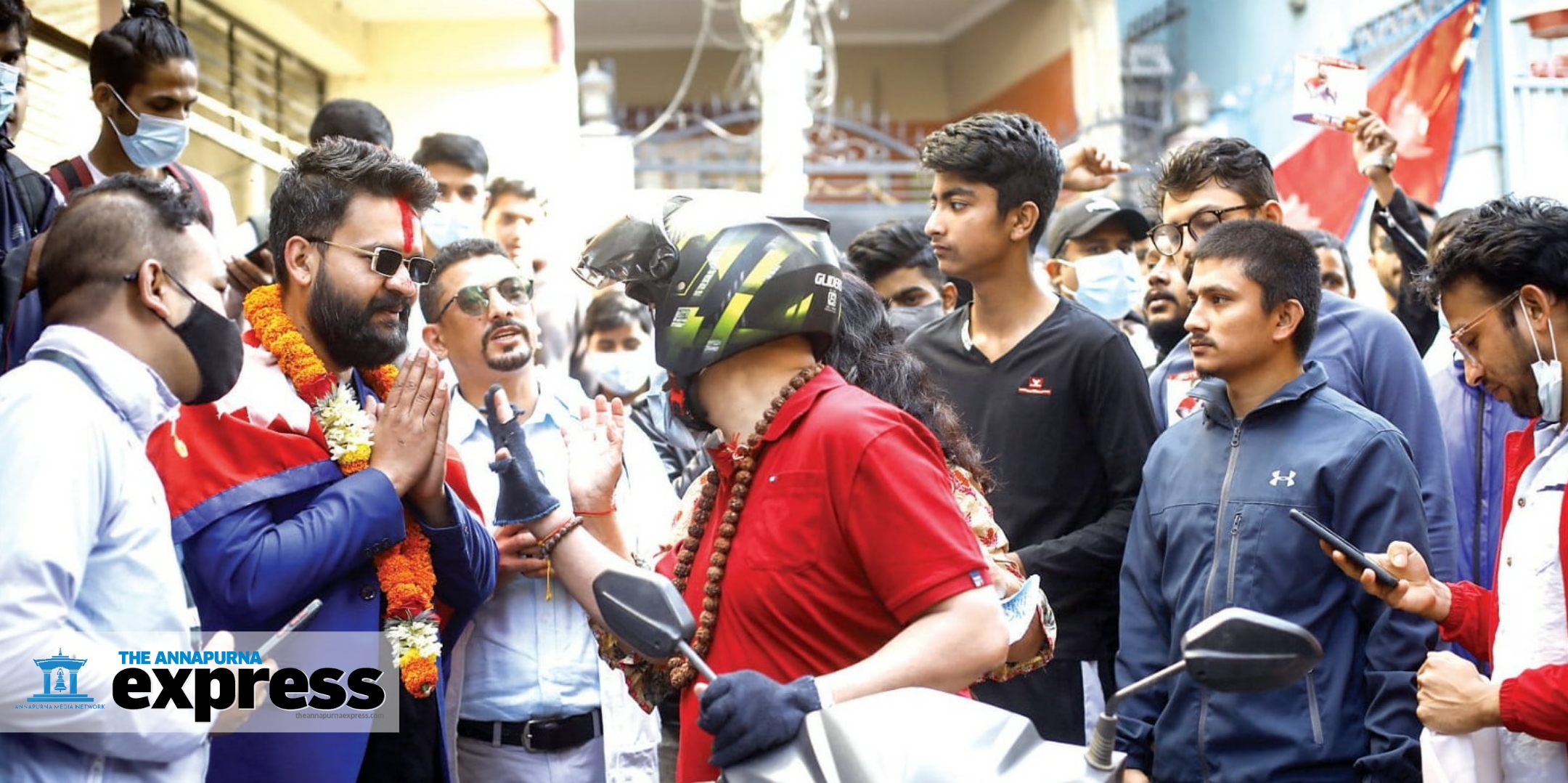 Photo: Saroj Baizu
Photo: Saroj Baizu
Do you have any plans on registering a political party?
No. While I do believe in a multi-party system, I also believe that local bodies don’t need political parties. Elected representatives should be busy working for people’s welfare. So a social reformer with a proper vision and action plan should lead at the local level. The third tier of the federal government should be free of political parties.
How do you view your rivals in this race?
We all know they have no proper agenda, as has been proven by recent mayoral debates and public interactions. They talk about beautiful Kathmandu, but they are yet to explain what they mean by ‘beautiful?
I, on the other hand, have analyzed real data, shortlisted problems, researched applicable solutions, and prepared a blueprint for everything. We are talking about the processes that will give us results.
If you win, what changes can we expect in Kathmandu after five years?
The basic but notable things. When you step out of your house, you have to face dozens of hassles such as unsafe roads, traffic jams, and pollution. These things contribute to your mental fatigue. Similarly, community schools will prioritize children’s skill development and offices will adopt digital technology for swift, efficient services. If I win, you will see a hassle-free Kathmandu Metropolitan City. I will implement tried and tested plans for this city.
Video interview (Engineers Vlogs with Balen Shah) here.
The May 13 vote at a glance
Preparations are in full swing for the May 13 local-level elections. Political parties and candidates are out barnstorming while the Election Commission is doing its part to conduct a free and fair vote.
For political parties, particularly those in the Nepali Congress-led ruling coalition, these past few weeks have been hectic. For days, the ruling parties were busy divvying up seats as they had decided to forge an electoral alliance against CPN-UML, the main opposition.
The ruling Congress, CPN (Maoist Center), CPN (Unified Socialist), and Janta Samajwadi Party have nominated common candidates in most local bodies and are competing individually only in a few places.
Similarly, UML, too, has cobbled alliances with small opposition parties like Loktantrik Samajwadi Party and Rastriya Prajatantra Party in many places. The main opposition, however, has called dibs on mayoral seats in almost every metropolis, sub-metropolis and municipality.
The electoral alliances have also led to resentment and dissatisfaction in some parties.
As a result, many local politicians have registered themselves as rebel candidates after being denied tickets from their parties. For instance, Jagannath Paudel of Congress has filed his candidacy against Renu Dahal of Maoist Center in Bharatpur Metropolitan City. Likewise, in Pokhara Metropolitan City, Nanda Tiwari and Hrishi Sapkota of Congress have stood against the Unified Socialist candidate, Dhanraj Acharya.
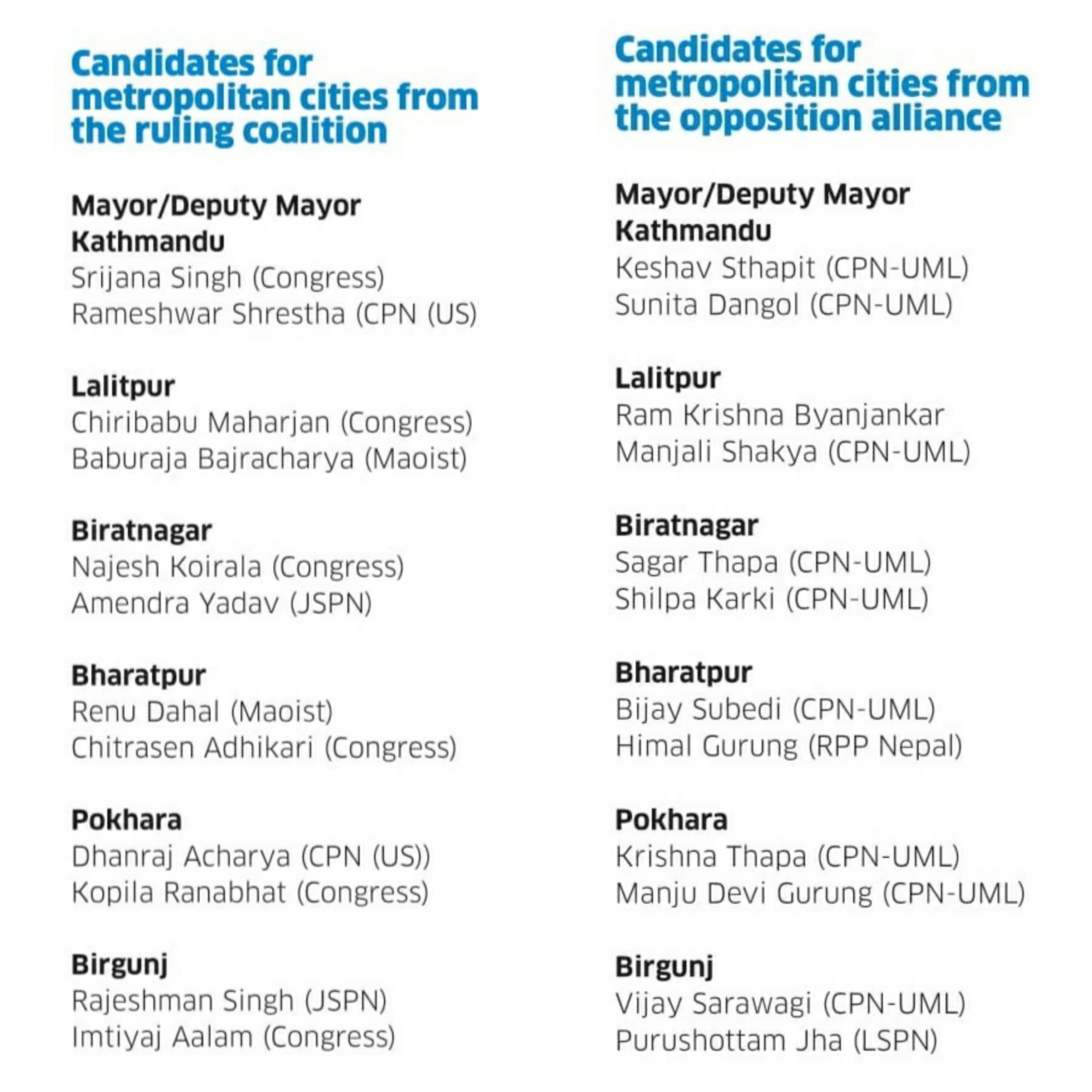
There are also several independent youth candidates this time. Rapper and structural engineer Balen Shah is running for the mayor of Kathmandu Metropolitan City. Similarly, Ganess Paudel has filed an independent candidacy for Pokhara Metropolitan City’s mayor. Young and independent candidates are also contesting at the municipal level.
Among the mayoral aspirants this time are also some provincial lawmakers. They have resigned as assembly members to contest the May 13 elections.
According to Saligram Sharma Paudel, spokesperson of the Election Commission, 137,043 people have filed their candidacies for 35,221 posts this time.
Of them, 3,276 are for mayor, 2,009 for deputy mayor, 3,264 for chairperson, 2,296 for vice-chairperson, and 32,217 for ward chairperson. Similarly, 23,521 candidacies have been filed for women members, 21,221 for Dalit women members, and 49,239 for ward members.
Kaike, Charkatangsong, and Shey Phoksundo rural municipalities of Dolpa district have already elected their chairs and vice-chairs unopposed after only Unified Socialist filed its candidacy.
There are over 10,000 polling stations all over Nepal. The Home Ministry has categorized around 3,000 of them as ‘very sensitive’ and 4,000 as ‘sensitive’ and is preparing to mobilize security personnel accordingly.
Nearly 100,000 temporary police have been hired to assist the 60,000-strong Nepal Police for election security. The Armed Police Force will also be deployed on patrol, and to secure election offices. Similarly, Nepal Army soldiers will also be involved in various poll security duties, including securing airports and prisons.
Around 2,000 officers of the National Investigation Department will be mobilized to collect vital security information and coordinate with the police forces.
‘Preparations are on track’
Dinesh Kumar Thapaliya
Chief Election Commissioner
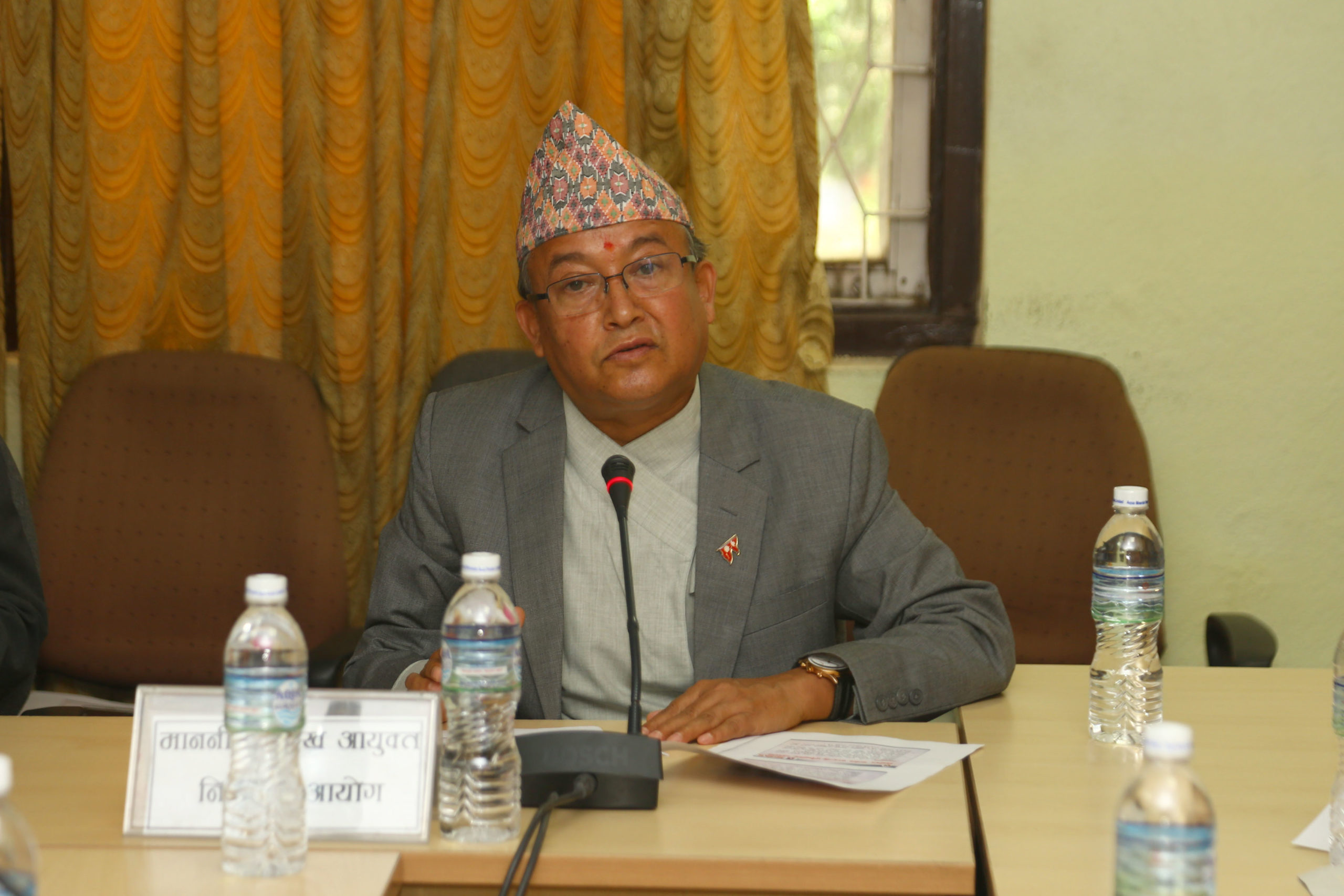
The commission is responsible for meeting almost every logistical election need. So we need to get many things right to conduct free and fair elections. Due to the many posts at the local level, managing ballot papers is a little tricky. Yet, we are on schedule and everything is on track.
We are in the process of finalizing candidates and giving them election symbols.
Ballot papers are also being printed, and other necessary materials are being sent to respective election offices. We are playing our part and I request other stakeholders to do the same, especially the political parties, whom I request to adhere to the election code of conduct.
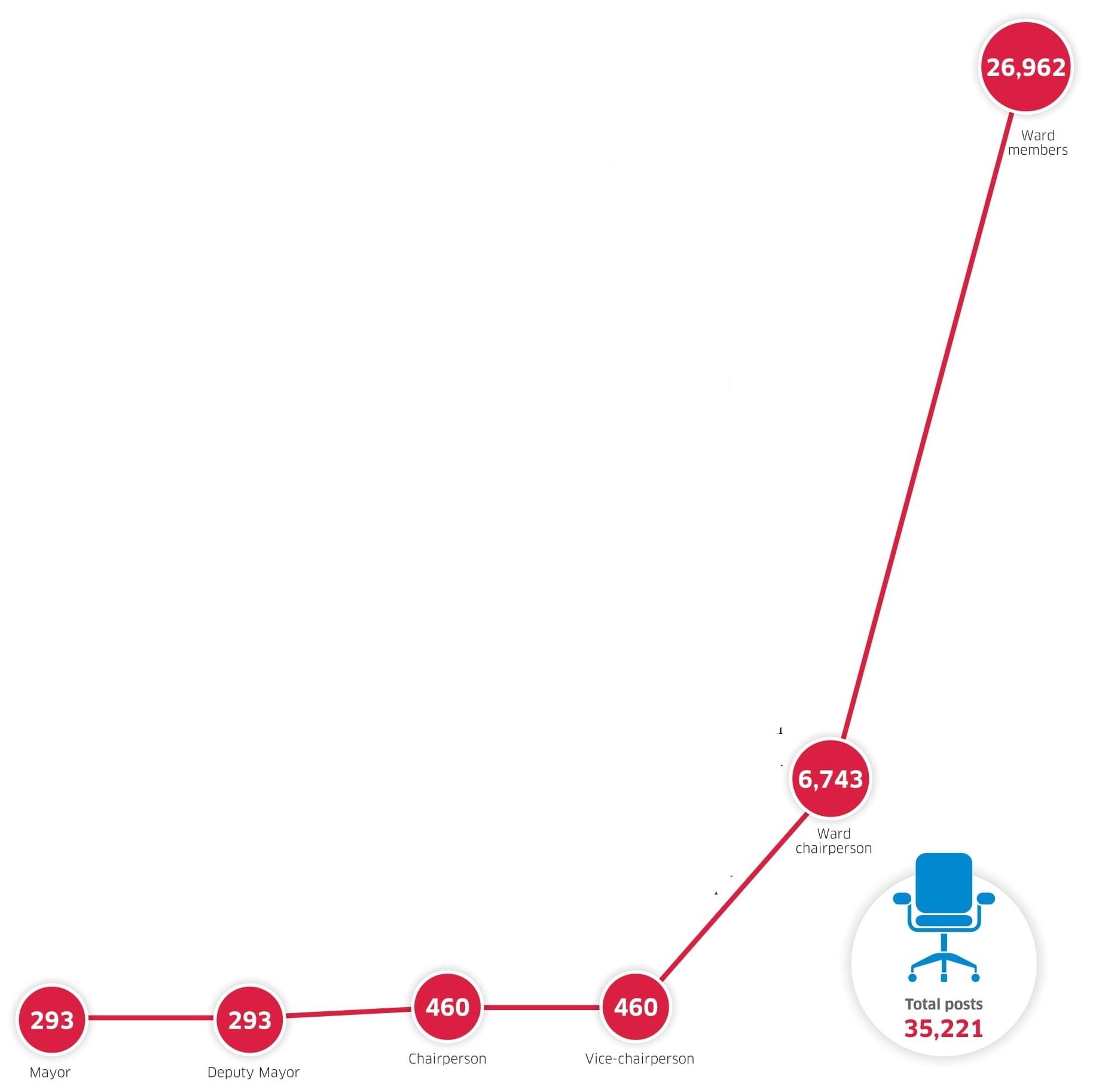
137,000 in the fray. Battle between old and new
Over 17m potential voters. A touch above 137,000 candidates. More than 35,000 positions up for grabs. The May 17 local elections will be a gargantuan undertaking any way you look at it.
The ruling alliance of Nepali Congress, CPN (Maoist Center), CPN (Unified Socialist), and Janta Samajwadi Party have nominated common candidates in most local bodies.
The main opposition, CPN-UML, has also stitched alliances with small parties like Loktantrik Samajwadi Party and Rastriya Prajatantra Party in some places, even though it is contesting major mayoral and municipal seats on its own.
There are also many promising independent youth candidates this time. Rapper and structural engineer Balen Shah, for instance, is running for mayor of Kathmandu. Ganesh Paudel, another independent, has filed candidacy for mayor of Pokhara. “Such youth candidates give local elections a breath of fresh air,” says civil society leader Shyam Shrestha.
Some provincial lawmakers are also in the mayor and chairperson race. Provincial lawmakers resigning to contest posts at the rural municipality level shows “how important the third tier of federalism has become,” says Shrestha. This, again, is “something to be celebrated”.
But Shrestha is troubled by the ‘coalition culture’. So is Krishna Pokharal, a political scientist. “Even though there are plenty of independent candidates in the fray this time, electoral alliances have greatly reduced the options for the voting public,” he argues.
Yet Pokharel still expects many new faces to emerge from the May 13 polls. In the previous local-level by-elections in 2019, people had thrown out many incumbents. “If they could so harshly evaluate their representatives in such a short time, I am expecting an even closer scrutiny this time.”
One thing is for sure: we are in for plenty of nail-biters.
Also read: The May 13 vote at a glance
Dr Anup Subedee: Too early to predict next covid wave
Covid-19 cases are surging in different states of India. The country’s positivity rate, which indicates the spread of the disease, has gone up to three percent from 0.5 percent—within a week. As Nepal shares a 1,850km-long open border with India, there is a risk of a coronavirus resurgence here as well. With local-level elections knocking on the door, political campaigns and rallies could also fuel the spread. Pratik Ghimire of ApEx talked to Dr Anup Subedee, infectious disease consultant at Medharma CliniX.
Can we predict the next covid wave in Nepal based on what is happening in India?
Cases in India directly impact Nepal, as we saw in the previous waves. But till this point, the new covid cases in India are yet to be thoroughly examined. So it is difficult to predict what will happen. Indian officials claim no new variant has been detected, but I doubt there has been enough research.
Is the next wave the most likely scenario in Nepal?
If the new cases in India are of the current Omicron (BA.2) variant, there is a low probability of an outbreak, as two waves of a single variant are rare. An increase in new cases is not a new thing, as the covid trend suggests a rise in such cases every few months. This is both predicted and expected.
Yet, every six months, we have seen a new variant too. If that happens, it could result in the next wave. But again, it is too early to predict because we have little information as of now.
Could upcoming elections help with the spread of coronavirus?
Hard to say. But mass demonstrations and political campaigns that took place in Kathmandu during the Delta variant surge had played a key role in previous outbreaks. So elections this time could also have an impact, as there will be more than usual mobility of people. Nepalis working in India will come home to vote. This could lead to the virus reaching various corners of the country. Everything depends on which variant it is—the old one or the new.
Right now, we don’t have many cases, so there is nothing to panic about. But that also suggests we might not have conducted enough tests. Further, the Health Ministry doesn’t have real data. It is important to fill these gaps because we can’t prepare and fight effectively without real data.
What do you suggest?
The holding centers and quarantines should be in working condition. We rushed to set up the infrastructure only after the pandemic hit the country. By that time, it was too late. So preparation is important.
To some extent, our incompetence has also invited trouble. The vaccine campaign looks dormant at the moment. Many people don’t know the current vaccine situation in Nepal. There are eligible people who are yet to get the jabs. Some have refused to take them, but the government should convince them. Also, the vulnerable groups have not gotten their booster doses. Many have not even taken the second dose.
Again, we have no proper data to track things down. For the current variant, the vaccines that are being given to Nepalis are fine, but there could be better options. The authorities should focus on importing more effective vaccines.
How long do we need to keep taking booster doses?
Booster doses should be routinely administered unless a vaccine that provides lifelong immunity is invented. We should also import the most effective vaccines like Viral Vector (AstraZeneca) and RNA (Moderna, Pfizer). Novavax is also effective.
Fast track: Growing burden
We wrap up our 10-part InDepth series on the Kathmandu-Tarai fast track project on a somber note. The 72.5km expressway comprises 55.5km of road, three tunnels with a combined length of 6.41km, and several bridges measuring a total of 10.59km. The project has been marred by years of delays and cost overruns—and these problems are likely to be compounded in the country’s new economic reality. The army has made a mess of it, handing out crucial bits to dodgy foreign contractors and taking its own sweet time even as it continues to ask for more and more money.
Five years into the project, only 16.1 percent work has been completed. Land-compensation issues are yet to be settled. Tunnels yet to be cut through. Environmental concerns have been given a short shift. It is hard to be optimistic about the future of this ‘national pride project’ that has already cost the exchequer Rs 25.4bn.
Either the project has to be scrapped without further delay or the state must ensure it is not pushed beyond its new January 2025 deadline. Our calculations suggest more delays could exponentially increase costs and make the project unviable. Time then for all the concerned to go back to the drawing board.
Full story here.
Fast track: National pride or another white elephant?
“We can complete the project by the deadline if the government allocates sufficient funds and settles land acquisition-related disputes.”
This has been the refrain of the Nepal Army, the official contractor of Kathmandu-Tarai Fast Track Road Project, at every press meet since it got the job on 11 Aug 2017.
Over the years, the project has suffered numerous cost and time overruns, but the army hasn’t stopped repeating this excuse. The initial deadline was Sept 2021. But now it has been pushed to Jan 2025. Similarly, estimated project cost has gone up to Rs 213bn from the initial Rs 86bn.
In its latest press meet held on Feb 22, the army insisted that the project was “on track despite some hurdles”. It also assured that work would pick up pace in the second half of 2022.
The army aims for 21 percent overall progress by the end of this year. But with only 16.1 percent physical progress till date, experts doubt the goal will be achieved. In fact, some have even warned that the fast track could turn into another seemingly never-ending project, like the Upper Tamakoshi Hydropower Project and Melamchi Drinking Water Project.
The 72.5km expressway, which will be the shortest route between Kathmandu and the Tarai, comprises 55.5km of road, three tunnels with a combined length of 6.41km, and several bridges measuring a total of 10.59km.
Also read: Lack of fast track progress raises questions over Nepal Army’s credibility
Tunnel construction is among the most challenging and time-consuming parts of the project. The army has handed over the task to a pair of Chinese firms under two packages.
The first, for the construction of Mahadevtar Tunnel, was given to China State Construction Engineering Corporation Ltd. The second package for Dhedra & Lendanda Tunnels went to Poly Changda Engineering Co. Ltd. But the Public Procurement Committee of Parliament says these contracts were issued by breaching the country’s procurement regulations.
Altogether 22 companies had expressed interest for the second package contract, but the army shortlisted only one of them—Poly Changda Engineering. Procurement regulations say more than one bidder must be shortlisted.
The parliamentary committee’s direction to cancel the contract and call for a fresh bid was not heeded by the army.
Questions were also raised over the selection of China State Construction Engineering for the first package of the tunnel deal, as the company had not made it past the pre-qualification bidding phase.
Pre-qualification is the second phase of the bidding process where companies are shortlisted based on the strength of their technical documents. The third phase is where the shortlisted firms present their financial proposal and the project goes to the one that quotes the lowest price.
Also read: What if… the fast track project was completed on time?
The army has been accused of brazenly disregarding standard procurement practice while selecting these two Chinese companies.
Earlier in 2019, the army had also courted controversy for allegedly leaking the evaluation criteria for the selection of consulting firms to potential bidders. The decision to select six international companies was eventually scrapped over the leak, which the army termed a “technical error”.
Similarly, a government review committee in 2020 had opened an investigation after the army was accused of unduly favoring South Korea-based Yooshin Engineering Corporation while selecting a design and supervision consultant for the expressway. Later that same year, the Korean firm was blacklisted by the World Bank Group for fraudulent practices in an aviation project in Vanuatu. But Yooshin Engineering is still associated with the fast track.
Those closely following the project say the army’s works thus far offer little assurance of the expressway’s timely and cost-effective completion.
Bharat Kumar Shah, chairman of the parliament’s Public Accounts Committee, says the project would have been completed on time had the army listened to the committee.
“We had asked the Nepal Army to halt bridge and tunnel works following discrepancies in bidding, but it simply brushed aside our directive,” says Shah. “Had the army listened to us, a more capable company would have gotten the project and it could have been completed on time.”
There are still elements of the fast track, mainly bridge construction, that the army is yet to invite bids for.
Also read: Army veers off the environment track
Semanta Dahal, a lawyer and researcher, says the project won’t get the desired momentum until the remaining bids are called. He also stresses the need for procurement transparency.
Tulsi Prasad Sitaula, a former government secretary, agrees. He says the project will miss its deadline if international contractors are not selected on time.
“The deadline could be pushed back by at least another year if there are more delays,” he says.
The army, meanwhile, says that should the project get delayed, it won’t be because of its fault.
Brig. Gen. Bikash Pokharel, the project head, says the government has not allocated enough budget.
The year the fast track was handed over to the army, the government at the time had allocated Rs 1.35bn. Subsequent governments then earmarked Rs 8.6bn, Rs 5.97bn, Rs 4.46bn, and Rs 8.93bn respectively. To date, the army has only received Rs 25.4bn—and it requires almost Rs 63bn annually hereon in for timely completion.
Hence the army’s contention that the expressway is not getting enough budget is not unfounded.
Experts worry the more the project is delayed, the more the costs will rise. The National Planning Commission has already projected the expressway cost to balloon to Rs 300bn even if it is completed by the Jan 2025 deadline.
The completion of Kathmandu-Tarai fast track is important for Nepal to meet its development goals. For this, the country must invest 13 to 15 percent of its GDP in infrastructure over the next two decades. But it has consistently failed to allocate the required budget.
Also read: Destroyer of civilization?
In 2020, the government needed to allocate around $1.3bn on roads and highways alone. The eventual allocation fell well short of that. The country’s annual infrastructure spending is expected to reach $5.6bn by 2025 and $7.5bn by 2030. It’s clear that the government cannot finance such expensive infrastructure projects.
With elections of all three tiers of government approaching and the country staring at a possible economic crisis, some observers already doubt the project’s feasibility.
Govinda Raj Pokharel, a former NPC vice-chairman, says it is hard to believe the fast track will be completed on time, particularly in the current economic climate.
“Construction materials need to be imported and with our foreign reserves depleting, the fast track’s fate hangs in the balance,” he says.
There is also concern about the expressway’s feasibility. Separate feasibility studies by Japan and the Asian Development Bank had suggested the route could be underutilized, given the existence of many other road links between Kathmandu and the Tarai.
Also, the estimated 90-minute travel time is applicable only for passenger buses and cars, not cargo trucks, which could take 5-7 hours to traverse the route.
Also read: What’s driving up land prices along the fast track?
A former government secretary says the expressway is not viable economically.
“The fast track cannot generate profit and will thus be a burden for the government,” he says. “The fast track also runs through an earthquake-prone area, presenting additional challenges.”
The land acquisition and rezoning dispute in Khokana and Bungamati areas have also halted progress. The people of these two ancient Newa villages in Lalitpur district have long been protesting against the expressway, which, they fear, could destroy their culture and heritage.
Moreover, the fast track is connected to other mega projects like Nijgadh International Airport, Outer Ring Road, dry ports, and other supporting highways. All their fates are tied to the expressway.
But sluggish progress, ballooning cost, lack of transparency, and doubts about economic unviability threaten to turn the fast track into the proverbial white elephant.
What’s driving up land prices along the fast track?
A recent Nepal Rastra Bank report suggests that property price in Kathmandu Valley is increasing at the rate of 27.7 percent a year, doubling the real estate value every 3.5 years.
In fact, almost every developing area of Nepal is witnessing this phenomenon. Property-price appreciation is starker still in the Madhes province and the Tarai towns of Sudurpaschim province.
Generally, in developing countries like Nepal, when an infrastructure project starts in an area, the value of nearby lands go up. And this is true in the case of Kathmandu-Tarai fast track.
Almost 30km of the 72.5km expressway passes through agricultural land, which also includes some residential areas. There are two big settlements along the way: Khokana-Bungamati of Lalitpur and Nijgadh of Bara, which are also the start and end points of the under-construction motorway.
Land prices have soared in Khokana-Bungamati and Nijgadh. But then it is not just the fast track that is driving up land values in these areas.
Many high-profile people are buying lands from locals and pushing their value with the help of realtors, claim locals.
When this reporter asked residents of the Shikali temple area in Khokana about the skyrocketing land value, they said ministers, ex-ministers, senior politicians, senior civil servants, judges, and other celebrities have made significant investments in local lands.
These individuals are allegedly working in cahoots with realtors to jack up property prices.
Some residents of Khokana also accuse the activists and leaders campaigning against the fast track of succumbing to greed and selling their lands.
The people of Khokana and Bungamati have long been protesting against the expressway project, which, they fear, could erase the culture and heritage of these two ancient Newa villages.
Nepal Man Dangol is among the leaders of a struggle committee against the fast track. But some villagers have accused him of “double standard” for selling a plot of his to the army and buying off properties close to the project site.
In his defense, Dangol says he let the army acquire his land as he urgently needed money. The decision to sell the land was “approved by the struggle committee,” adds Dangol.
He also doesn’t believe land prices in Khokana and Bungamati have been deliberately inflated.
“In the outskirts of Kathmandu Valley, land prices have reached over Rs 5m an aana (an anna is 31.8 square meters),” he says. “Prices in Khokana are still around 3m an aana.”
But Dangol’s claim doesn’t explain the sheer volume of land transactions taking place in Khokana.
According to the Land Revenue Office, Lalitpur, 20 to 25 land plots in Khokana are bought and sold every month. Just a few years before, there were barely five land transactions a month.
Locals say, in parts of Khokana, land value has quadrupled in a matter of years.
And then there are also claims of CPN-UML, the main opposition party in the federal parliament, playing a role in making Khudol of Khokana the start point or ‘Kilometer Zero’ for the fast track.
Although the project’s first draft had suggested Khudol as the fast track’s starting point, it was shifted 4km south to Farsidol of Bungamati following protests in May 2018. But the army again rezoned Khudol as Kilometer Zero without offering any explanation.
Rabindra Maharjan, ward chair of Lalitpur Metropolitan City-21, says 300 Khokana residents had submitted a petition to the then Defense Minister Ishwar Pokhrel against Farsidol’s designation as the fast track’s entry point.
“The majority of petitioners were from the UML faction of the then Nepal Communist Party (NCP),” he says. “You can guess why the Kilometer Zero mysteriously came back to Khudol.”
But Maharjan himself is accused of abandoning the cause of Khokana-Bungamati residents. Many people say he started distancing himself from the campaign soon after he was elected ward chair. Maharjan denies the allegation.
“I was the one to start the campaign,” he claims. “Many times, I have condemned the decision of my own party-led government in the Khokana case.”
While the cause of Khokana and Bungamati residents may have been consigned to the back burner, the buying and selling of the now premium properties continue.
Dangol, who seems to have fallen out of favor with Khokana residents, says allegations against him weaken the campaign. He says he is a businessman and his decision to invest in properties should not be misconstrued as a betrayal.
“I have bought and leased lands in various parts of Kathmandu Valley, mainly for farming purposes,” he says.
According to the army, compensations for 4,744 ropanis (a ropani is 508.74 square meters)—or 96.47 percent of the total land that needs to be acquired—have been handed out. But compensation for 427 ropanis of land is as yet unsettled due to the Khokana dispute.
In Khokana, per ropani price of land has been set at Rs 4.4m, Rs 3.6m and Rs 2.5m, varying with location. In Bungamati, land has been valued at Rs 4.1m, Rs 3.3m, and 2.4m respectively.
Elsewhere in the town of Nijgadh, the end point of the fast track, land prices have gone up as well.
During ApEx’s ground reporting, our team interviewed Sanjay Lama, a local hotel owner and real estate investor. He never thought property value in the area would shoot up.
“Real estate has boomed in Nijgadh,” he told us. “Land prices have gone up almost 10 times in the past five years.”
At the time of the interview, the price of a kattha (a kattha is 338.62 square meters) of land connected to the Mahendra Highway was about Rs 4m. Within a one-kilometer radius of the highway, the price was Rs 3m per kattha.
Before the expressway plan, land price hadn’t crossed Rs 300,000 a kattha, according to Lama.
Since Nijgadh will be the nearest Tarai town from Kathmandu after the construction of the fast track, many industrialists have bought lands there. Some have bought up to 50 bighas (one bigha is equal to 2528.81 square meters) of land to set up factories.
Most of these land buyers are from Kathmandu, Makwanpur, Jhapa, Chitwan, Morang, Sarlahi, Saptari, Mahottari, Dhanusha, Siraha and Surkhet districts.
Lama conceded that competition between local realtors had, to an extent, contributed to land-price hikes.
The fast track also passes through parts of Makwanpur district, but land rates there have not witnessed drastic changes.
In Makawanpurgadhi Rural Municipality, for instance, there has been no noticeable change in land transactions, both in terms of price and frequency.
Says Harka Maya Rumba, vice chairperson of the rural municipality, even though some people had plotted their land in the initial days of the fast track construction, they could not get buyers.
“People were not interested in investing here as there are unlikely to be arterial roads connecting the villages to the expressway,” she adds.














